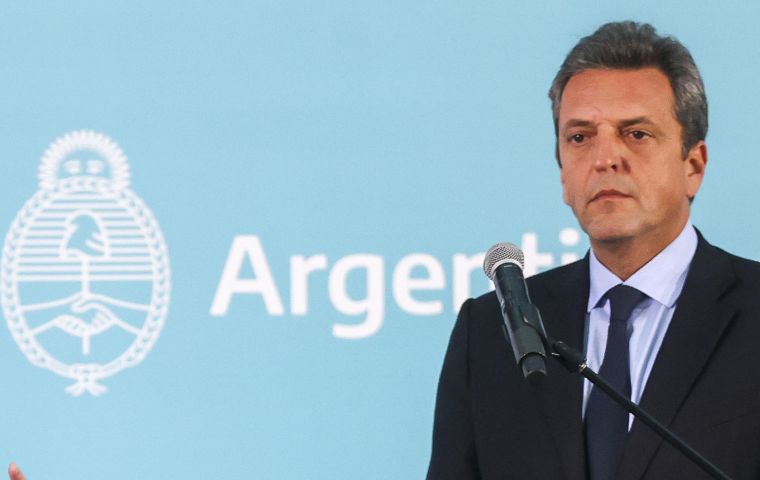MercoPress. South Atlantic News Agency
Argentina: US dollar recoils after Minister Massa's measures
 Massa managed to calm down the market frenzy
Massa managed to calm down the market frenzy After the “blue” (a euphemism for “black market”) dollar reached nearly AR$ 500 on Tuesday, Superminister Sergio Massa's measures “in order to avoid speculative maneuvers” resulted in a drop to AR$ 474, it was reported in Buenos Aires.
The official dollar stood at AR$ 228 on average, while the dollar with a 30% “solidarity tax” and a 35% income tax advance payment reached AR$ $376.91, while the so-called Qatar dollar (for expenditures abroad) -which has a 45% tax- stood at AR$ 399.75, or at AR$ 456.86 with the additional 25% tax for purchases over US$ 300.
In addition to heralding this week's trip to the International Monetary Fund (IMF) for further borrowing with which to stabilize the markets, Massa also launched a call to businessmen and labor unions to “establish the path for the next 90 days” in terms of prices, and thus avoid “justified traps” in the rise of parallel dollars.
“It is key to bring businessmen and workers to the table to establish the path for the next 90 days so that there are no justified traps in this that some people tried to generate on the basis of rumors and versions,” Massa told General Workers' Confederation (CGT) leaders and social movements during a meeting at the Economy Ministry where he received the endorsement he was looking for.
“We are present at the moment the Argentine people are going through, we are here to guarantee the support and confidence to generate conditions of stability for our people,” CGT Secretary-General Héctor Daer said while condemning “a few small groups of people who use the means of gambling end up harming the workers, the social organizations and the retired people.”
At the same time, Massa also announced Wednesday that Argentina would stop paying imports from China with US dollars and switch to yuan instead. “This improves Argentina's reserve outlook in terms of net reserves,” stated the Minister of Economy together with Chinese ambassador, Zou Xiaoli.
Massa announced Wednesday that the country will use yuans this month for the equivalent of US$ 1.04 billion to import intermediate goods from China, as a way to maintain the level of activity, without compromising the Central Bank's reserves. He also highlighted that Argentina “has a swap with China that not only serves to strengthen reserves but also to strengthen bilateral exchange”.
“The biggest drought in history, which left us with US$ 15 billion less to export forced us, and the International Monetary Fund, to redefine the import and export program,” Massa added.
”The Export Increase Program (PIE, for its acronym in Spanish - also known as the 'agrodollar'), not only with soybean, but also with regional economies, begins to show signs of good performance, and also forces us to rethink our imports,” Massa also explained.




Top Comments
Disclaimer & comment rules-

Read all commentsDoesn’t actually say what ‘measures’ he took other than to plan to borrow more money, hard currency at least, which has to be better than printing Pesos.
Apr 27th, 2023 - 11:07 pm 0But still has to be paid back, in hard currency.
And which at best can only be a temporary measure anyway.
Where do you go from there???
Magic wand time, a Unicorn intervention maybe???
Commenting for this story is now closed.
If you have a Facebook account, become a fan and comment on our Facebook Page!